
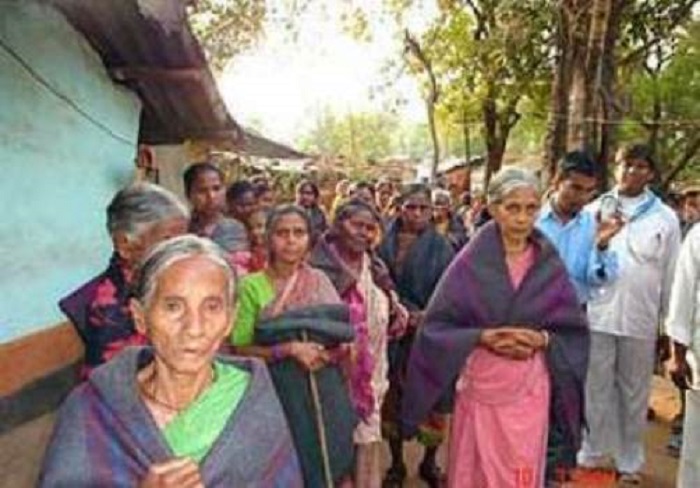
Multiple Help at Lepers Colony
Introduction:
A Leper colony (Naya Bazaar Kustha Ashram) lies some distance away from the township of ‘steel city’ Rourkela, in Orissa, a state in North East India. ‘Kustha’, in Oriya (the language of the state in India) means leprosy. In this colony, amid rundown mud thatched houses, live around 300 people, labeled as lepers and permanent outcasts by society and made to suffer a life of ostracism, poverty, and neglect. The turnaround brought about in this despised-by-all settlement by the Sai workers of this region is most stunning and stands as testimony to the power of Pure Love that Sathya Sai Baba of India taught. Now, this area has turned into a land of love, which can turn even the most stone-hearted individual into a ‘Mother Teresa’ or a ‘Mahatma Gandhi’.
Children of God (Narayanas)
Sai volunteers never call them ‘lepers’ because they are children of God, and in Indian language they are called Narayanas. They should not be reminded of their grim existence and future by using a word and name that reminds them of their disease. Use a name that reminds them and us too about their real nature: divinity.
Maximum Narayanas
Apart from Naya Bazaar (mentioned above), there are four more colonies in and around Rourkela – Durgapur, OMP Backyard, Tarkura, and Sector-6. Each accommodates around 250-300 Narayanas. This western part of Orissa has the maximum number of Narayanas in the state, particularly in the Sundergarh District.
Group spirit
In a bid to normalize the leprosy sufferers’ lives, Sai Volunteers began to attract other people's attention to the Narayanas’ plight and worked to improve the standing of the colony members in society. They had to battle against the prejudice that Narayanas are afflicted for the sins they committed in previous lives. The youth were never tired of convincing people that showing love toward another human being is the most powerful way to receive the blessings of God.
Sustained hard work
Over a period of time, five leprosy colonies, housing about 2000 residents, were adopted in this loving way by the Sai Organization. They started with Human Values classes for the children, then expanded into singing the glory of God, serving food, and other activities. Medical and self-discipline camps are also organized here.
Physical help
The Sai Center distributes artificial limbs to people who have lost their limbs due to leprosy on a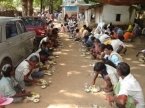 day known as "Disabled Day". Once a month, the Medical Camp provides an opportunity for cleaning and dressing of the Narayanas’ wounds by doctors and local Sai youth volunteers. The stench coming from the wounds is sometimes unbearable, and it requires every ounce of a person's determination to carry out the task. The volunteers and doctors also identify patients who need further medical attention and refer them to the relevant hospitals and specialists.
day known as "Disabled Day". Once a month, the Medical Camp provides an opportunity for cleaning and dressing of the Narayanas’ wounds by doctors and local Sai youth volunteers. The stench coming from the wounds is sometimes unbearable, and it requires every ounce of a person's determination to carry out the task. The volunteers and doctors also identify patients who need further medical attention and refer them to the relevant hospitals and specialists.
Supply of rations to stop begging
Sai youth have been inspired to help the Narayanas in other areas of their lives. Their harsh daily existence requires them to beg -- this being the most traditional way of earning their livelihood in a society that does not allow them to work. So, these Narayanas can be seen sitting outside temples and going from door to door, looking for alms. Unfortunately, during the summer months, Rourkela turns into a blazing oven resembling one of the furnaces at the Rourkela Steel Plant --even the road asphalt melts in the scorching sun! No one dares even to venture out in these blistering months, except those forced to beg to survive. Risking sun stroke, the Narayanas used to start out no matter what the temperature, for they had no choice -- the only alternative being to starve to death.
This was their terrible situation, until the Sai Center came to their rescue with an initiative called 'Amrutha Kalash': ‘Pot of Nectar’ (it contains food ration items).
Collective contributions
Every Sai family now saves a fistful of rice every day. When the lady of the house prepares food for her family, some of the rice grains are kept aside to be given in alms while chanting God’s name of their choice. When the blistering summer months set in, the Sai Center collects all the set-aside rice and other food grains from the devotee homes and distributes these as two month’s rations for each of the colonies. For the family, it may be a small act, but for the Narayanas it is life-saving in every way.
Water facility
On one of the regular visits to the colonies, a few devotees observed that the Narayanas had a great deal of difficulty drawing water from the well. Their mutilated fingers and hands were not able to grasp the rope to draw the water. A scarcity of funds did not deter the Sai Organization from remedying this situation. Twenty days after the idea surfaced, a water project for the colony was born; an electric pump was fitted to pump the water to an overhead tank. Now the Narayanas easily procure clean and pure drinking water by a simple turn of the tap, which is, after all their right.
Young children to the right path
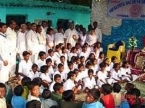 The children of Naya bazaar colony are now in their Human Values Group 3 classes. These children chant God’s names as well as verses from scriptures with right intonations. They are encouraged to continue and complete their studies in the local school provided to them by the government, and a few bright and deserving students’ fees are also sponsored by the Sai Center so that they can complete their graduation.
The children of Naya bazaar colony are now in their Human Values Group 3 classes. These children chant God’s names as well as verses from scriptures with right intonations. They are encouraged to continue and complete their studies in the local school provided to them by the government, and a few bright and deserving students’ fees are also sponsored by the Sai Center so that they can complete their graduation.
Additional Info
Project Coordinator: Sri Sathya Sai Seva Organisation-Odisha
Contact Person:Sri P. Jagannath Prasad Rao, State President, Sri Sathya Sai Seva Organisation-Odisha State, mail ID: sp@sathyasaiodisha.org
Keywords
lepers colony Rourkela, Sathya Sai Seva Organisation, Rourkela, Land of love, Physical Help, Medical Camp to lepers, Odisha, Kustu, Oriya, Naya Bazaar Kustu Ashram, North East India, Stop begging, Rourkela Steel PlantProject Details
Project start: 11/23/00
Project completion:
Stage of development:
Zone name: India
Lat/Longitude: 22° 13' N 84° 52' E
Affiliation: Sri Sathya Sai Seva Organisation, Odisha
Service category: Medical clinic/camp
Author: VV
Project leader: P. Jagannath Prasad Rao
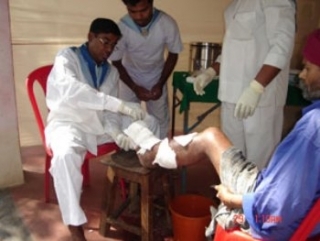
Personal medical care
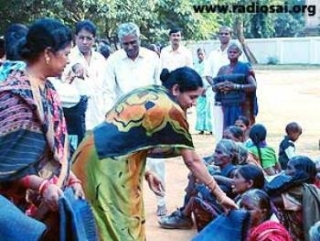
Extending help
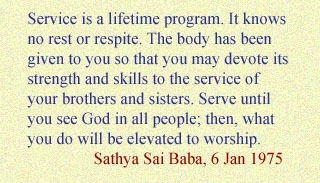
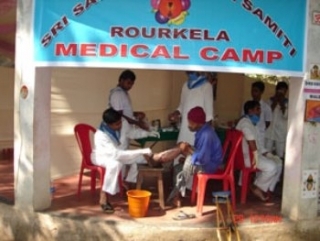
Medical camp
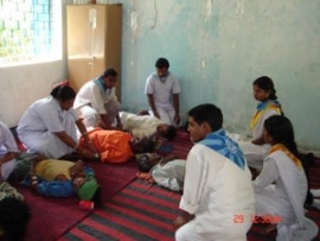
Individual attention
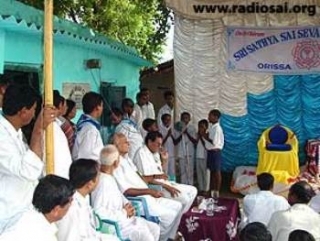
Teaching human values